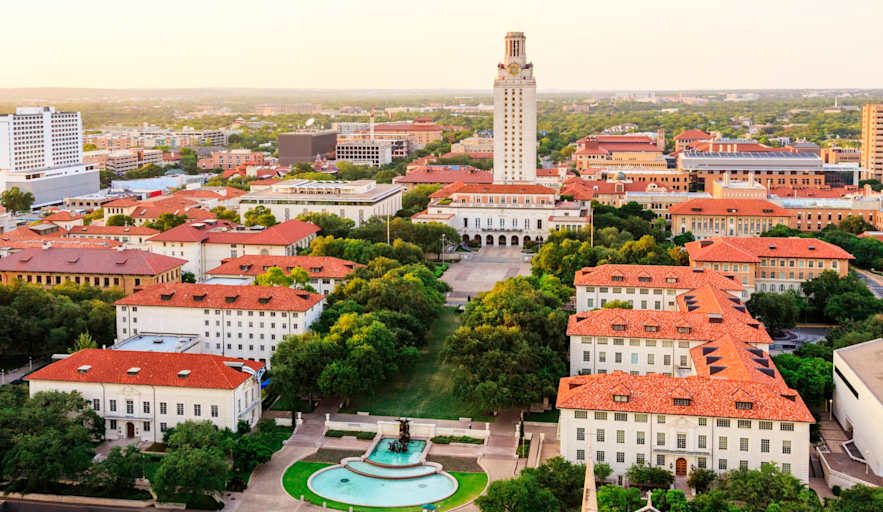Colleges in Dallas: All 12 Schools
Home to over a million people, Dallas features a robust business culture and easy access to other major Texas cities. Colleges in Dallas can help you start or further your career in this dynamic city and beyond.
Consider studying in Texas for the state’s lower-than-average cost of living and growing population. Reviewing the latest resources for students in Texas can also help you find the right school at the best price.
Featured Online Programs
5 Popular Colleges in Dallas
The five colleges in Dallas below represent a mix of public and private schools. They offer different undergraduate majors and career-aligned certificates for working professionals.
1. The University of Texas at Arlington
Consider a UTA education if you want academic choice. The university offers nearly 100 bachelor’s degrees in areas that include aerospace engineering and art history. The university also features some fully online degrees, such as nursing and substance abuse and treatment.
The typical UTA undergraduate spends $14,262 per year in tuition, fees, and other education-related expenses. The university charges out-of-state students an extra $420 per credit as of August 2023. UTA considers all incoming students for institutional financial aid.
2. University of North Texas
Students at University of North Texas can select from 112 bachelor’s degrees and 132 graduate degrees. Bachelor’s degrees include voice performance, construction engineering technology, and sports entertainment management. Online learners can choose from 1,600 classes leading to a certificate or degree.
UNT’s status as a public school means that the average student spends only $15,283 to attend. Sign in to the Eagle Scholarship Portal to explore and apply for institutional scholarships and grants.
3. The University of Texas at Dallas
Educating more than 31,000 students, UT Dallas features undergraduate degrees in biochemistry, education, and philosophy. The university also offers over two dozen doctoral programs. The Student Success Center’s tutors and other academic support services can help you during every step of your educational journey.
Expect to pay about $13,555 per year to attend UT Dallas. The university keeps an online database of upcoming scholarship opportunities. You can search by name, school, or academic program.
4. Southern Methodist University
Situated a few miles north of downtown, Southern Methodist University features over 100 majors that include African American studies, civil engineering, and international studies. Some bachelor’s degrees also offer specializations. Good grades may qualify you for the University Honors Program or the Hilltop Scholars Program.
Expect to pay about $45,090 per year at this private university. The SMU Mustang Scholars Program can help you bridge your financial aid gap and provide an intimate, cohort-based learning model.
5. Texas Christian University
A Christian school, Texas Christian University welcomes students from all backgrounds. You can choose from more than 200 degree-granting programs that include aerospace studies, environmental science, and psychology. The university’s robust career services department helps 80% of undergraduates complete an internship before graduation.
The typical TCU student pays $44,190 per year to attend. Fortunately, the university’s academic scholarships renew for up to eight semesters if you maintain a minimum 3.25 GPA.
List of All Colleges in Dallas
We’ve created a complete list of all four-year nonprofit colleges in Dallas. You can use the table below to compare data on student population and the average net cost.
The following school data comes from the National Center for Education Statistics (NCES). All data is from 2022. Note that colleges with a total undergraduate enrollment of fewer than 500 were not considered for this list.
| School | Total Student Enrollment | Avg. Annual Net Price | Acceptance Rate |
|---|---|---|---|
| Dallas Baptist University | 4,348 | $27,607 | 91% |
| Paul Quinn College | 938 | $12,409 | 57% |
| Southern Methodist University | 12,053 | $45,094 | 52% |
| Southwestern Assemblies of God University | 1,794 | $19,217 | 86% |
| Texas Christian University | 12,273 | $44,190 | 56% |
| Texas Wesleyan University | 2,578 | $15,652 | 61% |
| Texas Woman’s University | 15,958 | $11,682 | 94% |
| The University of Texas at Arlington | 43,946 | $14,262 | 81% |
| The University of Texas at Dallas | 31,570 | $13,555 | 85% |
| University of Dallas | 2,328 | $27,250 | 59% |
| University of North Texas | 44,767 | $15,283 | 79% |
| University of North Texas at Dallas | 3,685 | $10,351 | 94% |
How Much Is College in Dallas?
| Institution Type | Average Annual Net Price |
|---|---|
| Public 4-Year (In-state) | $15,756 |
| Private 4-Year (In-state) | $26,314 |
Public colleges in Dallas resemble those in other Texas cities in that they charge out-of-state students more than Texas residents. As a result, Texans may pay lower than the price below to attend a public four-year school. Degree-seekers pay the same at more expensive private schools, no matter what their state residency status is.
Your cost of attendance (COA) includes more than tuition. Attending one of the colleges in Dallas also involves paying for education-related expenses, such as transportation if you live off campus. Studying online may save you money on your education.
Scholarships for Dallas Students
You can lower your COA by researching scholarships for Texas students. Check these scholarships’ websites for further details.
Irma Gesche Scholarship
The $1,000 Irma Gesche Scholarship accepts applications from Texas residents attending a two- or four-year accredited college. The scholarship committee considers your grades, extracurricular involvement, and community service.
Submit high school transcripts, three recommendation letters, and an essay to apply by the January 31 deadline.
National Merit Scholarship
The University of Texas at Arlington (UTA) National Merit Scholarship awards up to $196,000 to eligible UTA degree-seekers. Other benefits include a $5,000 study-abroad stipend and a $3,000 Honors College stipend.
Requirements include becoming a National Merit Scholar. You do this by earning an excellent score on the PSAT and maintaining good grades throughout high school.
UNT Excellence Scholarships
UNT’s Excellence Scholarships award incoming first-year students $1,000-$12,000 per year. Requirements include submitting FAFSA results and high school transcripts.
The scholarship renews as long as you maintain full-time status and a 3.25 undergraduate GPA. Out-of-state students can apply and may receive an out-of-state tuition waiver.
Featured Online Programs
Frequently Asked Questions About Colleges in Dallas
What colleges are in Dallas?
Although not known as a lively Texas college town, Dallas features a mix of public and private schools, including UT Arlington, the University of North Texas, and Southern Methodist University. Dallas is also home to several religious schools, like Texas Christian University and Dallas Baptist University.
Searching colleges in Dallas reveals a mix of urban and suburban campuses. The latter may offer few public transportation links to downtown and other areas.
How many colleges are in Dallas?
There are 12 colleges in Dallas and nearby suburbs with a total student enrollment of at least 500. UNT and UTA feature a student body exceeding 40,000, while Paul Quinn College educates just under 1,000 learners. All schools accept more than 50% of applicants.
What is the cheapest college in Dallas?
UNT features the lowest average annual cost of all colleges in Dallas, making it one of the cheapest schools for residents. Studying at a private college in Dallas may increase your COA by as much as 400%.
You can reduce your COA in many ways, such as by exploring affordable online colleges in Texas. These schools may waive out-of-state tuition if you learn entirely online. Other benefits include saving money on textbooks, fees, and other education-related expenses.
Explore More College Resources

How Much Does It Cost to Study and Live in Texas?
Texas is one of the most affordable states for college tuition. Find the cheapest places to live in Texas and how much you can expect to spend.

by Alison Plaut
Updated August 1, 2023



